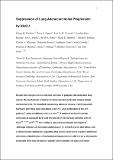Suppression of Lung Adenocarcinoma Progression by Nkx2-1
Author(s)
Winslow, Monte Meier; Dayton, Talya Lucia; Kim-Kiselak, Caroline; Snyder, Eric; Feldser, David M.; DuPage, Michel J.; Whittaker, Charles A.; Hoersch, Sebastian; Yoon, Stephanie M.; Crowley, Denise G.; Verhaak, Roel G.; Hubbard, Diana D.; Chiang, Derek Y.; Myerson, Matthew; Bronson, Roderick T.; Jacks, Tyler E; ... Show more Show less
Downloadmain article (1.869Mb)
OPEN_ACCESS_POLICY
Open Access Policy
Creative Commons Attribution-Noncommercial-Share Alike
Terms of use
Metadata
Show full item recordAbstract
Despite the high prevalence and poor outcome of patients with
metastatic lung cancer the mechanisms of tumour progression and
metastasis remain largely uncharacterized. Here we modelled
human lung adenocarcinoma, which frequently harbours activating
point mutations in KRAS and inactivation of the p53 pathway,
using conditional alleles in mice. Lentiviral-mediated somatic
activation of oncogenic Kras and deletion of p53 in the lung epithelial
cells of Kras[superscript LSL-G12D/+];p53[superscript flox/flox] mice initiates lung adenocarcinoma
development4. Although tumours are initiated synchronously
by defined genetic alterations, only a subset becomes malignant,
indicating that disease progression requires additional alterations.
Identification of the lentiviral integration sites allowed us to distinguish
metastatic from non-metastatic tumours and determine the
gene expression alterations that distinguish these tumour types.
Cross-species analysis identified the NK2-related homeobox transcription
factor Nkx2-1 (also called Ttf-1 or Titf1) as a candidate
suppressor of malignant progression. In this mouse model, Nkx2-1
negativity is pathognomonic of high-grade poorly differentiated
tumours. Gain- and loss-of-function experiments in cells derived
from metastatic and non-metastatic tumours demonstrated that
Nkx2-1 controls tumour differentiation and limitsmetastatic potential
in vivo. Interrogation of Nkx2-1-regulated genes, analysis of
tumours at defined developmental stages, and functional complementation
experiments indicate that Nkx2-1 constrains tumours in
part by repressing the embryonically restricted chromatin regulator
Hmga2. Whereas focal amplification of NKX2-1 in a fraction of
human lung adenocarcinomas has focused attention on its oncogenic
function, our data specifically link Nkx2-1 downregulation
to loss of differentiation, enhanced tumour seeding ability and
increased metastatic proclivity. Thus, the oncogenic and suppressive
functions ofNkx2-1 in the sametumour
Date issued
2011-04Department
Massachusetts Institute of Technology. Department of Biology; Koch Institute for Integrative Cancer Research at MITJournal
Nature
Publisher
Nature Publishing Group
Citation
Winslow, Monte M. et al. “Suppression of Lung Adenocarcinoma Progression by Nkx2-1.” Nature 473.7345 (2011) : 101-104.
Version: Author's final manuscript
ISSN
0028-0836
1476-4687